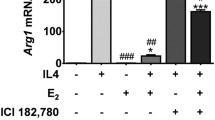Abstract.
Gender differences and variations in inflammatory disease (e. g. atherosclerosis, neurological disorders, periodontitis and rheumatoid arthritis) severity with female sex hormone level have been reported, suggesting that female sex hormones modulate the inflammatory response. Estrogens act on gene transcription via estrogen receptors α and β. Identification of estrogen-regulated genes is a matter of great interest since it will contribute significantly to the understanding of the physiological importance of estrogens. Anti-inflammatory as well as pro-inflammatory responses to estrogens have been reported. Data have been presented showing that estrogens down-regulate the expression of adhesion and chemokine molecules in response to inflammation promoters in various experimental systems. Functional data show that estrogen treatment attenuates recruitment and adhesion of leukocytes to the endothelium induced by inflammation promoters offering a possible mechanism by which estrogens exert an anti-inflammatory effect. These effects of estrogens, with focus on the interactions of monocytes with the vascular endothelium, are highlighted in this review.
Similar content being viewed by others
Author information
Authors and Affiliations
Additional information
Received 28 November 2006; returned for revision 31 January 2007; accepted by I. Ahnfelt-Rønne 20 March 2007
Rights and permissions
About this article
Cite this article
Nilsson, BO. Modulation of the inflammatory response by estrogens with focus on the endothelium and its interactions with leukocytes. Inflamm. res. 56, 269–273 (2007). https://doi.org/10.1007/s00011-007-6198-z
Issue Date:
DOI: https://doi.org/10.1007/s00011-007-6198-z




